Penetanguishene’s annual wastewater treatment report was recently presented at a committee of the whole meeting, with good news overall shared to council.
Chief operator Mark Charlebois of the wastewater treatment division informed council that the two wastewater or sewage treatment plants (STP) – the Philip H. Jones pollution control plant known as the Main Street STP, and the Fox Street STP – were in high performance for the town and the county.
“Both plants are running great and produced a high-quality final effluent,” Charlebois began, “and the loadings to Penetanguishene Bay were well below regulatory limits and the Severn Sound Environmental Association objectives.”
Charlebois noted that capacity for both plants averaged at 56.5 percent of rated capacity for 2021, but increased daily flows amounting to 4.8 percent for Main STP and 27 per cent for Fox STP combined for an average of 5.5 percent over the previous year.
Additionally, the heavy rain event of late June causing a raw bypass at the Fox STP was described by Charlebois as small, who stated that it was only the second overflow since the plant was built in 1986.
“You can see we’ve come a long way there; back in 1975,” said Charlebois addressing a sewage bypass overflow chart, “it shows over 2,700 hours of bypass when the plants were exceeding capacity, and even during the mid-1980’s you can see there were some pretty big spikes. But last year you can see we had the 2.4 hours; that was that little bypass at Fox Street.”
Five petroleum-based spills at the Main STP were contained through absorbent socks and reported to the Spills Action Centre, an amount equal to the year prior.
“Following the events, the roads crew investigated the collection system but could not determine the source. They did think that they found the source last year but the results were inconclusive, so further investigation is planned for 2022,” Charlebois stated.
The five sewage pumpstations of Navy Lane, Beck Blvd., Bellisle, Robert Street W., and Jennings, were all reported as operating properly. Charlebois noted that the Jennings station replaced an electronic programmable logic controller last year, and all stations have backup generators except for Navy Lane and Jennings which use a portable generator during extended power fails.
Low toxicity effluent discharge to fish and aquatic life at the Main STP passed for the seventh straight year, while one minor total phosphorus monthly concentration exceedance was reported for Fox STP in July.
Charlebois explained that the initialization of auto-thermophilic aerobic digesters have produced “a Class A biosolid; it’s one of the best biosolid quality in the county”; optimizations were enacted to reduce high levels of foam and associated alarms, resulting in a total decrease from 27 callouts in 2020 to zero in 2021 for a savings of $5,000 on the year.
Other savings gained from storing biosolid volumes instead of hauling costs were offset by increased hydro expenses at the plants.
Both Coun. Debbie Levy and Deputy Mayor Anita Dubeau inquired about the potential installation of solar panels to reduce hydro costs, but were replied to by public works director Bryan Murray that although the initiative was explored in the past, factors of high capital costs and equipment obstructions may have been a cause why it wasn’t pursued.
Coun. George Vadeboncoeur asked about the status of the sewer separation program throughout Penetanguishene, and was told by Murray that leaks discovered on the Fox sewer system – on the connections, not on the pipes – were in the process of being sealed.
Coun. Brian Cummings asked if increased flows at the Fox STP were a result of population increase from the Central North Correctional Centre connected to the line.
“I’m not sure what’s coming out of the building,” stated Charlebois. “I did check with the water department and not much has changed for water consumption so I wouldn’t think much has changed with the wastewater discharge.
“They’ve had some issues up there with their wastewater meter over the years, and it never did correlate exactly with the water meter,” Charlebois said, adding, “I’m not aware of the population changes up there but I believe we have some sampling we’re going to do.”
To conclude, Charlebois mentioned the town’s participation in the COVID-19 wastewater sampling program as one of two additional partners to the data collection provided by Midland, Orillia, Collingwood and Barrie.
“We’ve been on the waiting list for this program,” said Charlebois of an upcoming meeting with the Simcoe Muskoka District Health Unit, the Ministry of the Environment, Conservation and Parks, and others.
“It’s looking pretty good, so we’re looking forward to that.”
The Philip H. Jones pollution control plant (Main STP) is located at 24 Main Street, and the Fox STP is located at 146 Fox Street. The full wastewater treatment division annual report for 2021 can be located on the agenda page of the Town of Penetanguishene website.
Meetings of Penetanguishene council are held on the second Wednesday of each month, and can be watched live on Rogers TV cable 53, or on the Rogers TV website.
Archives of council meetings are located on the Town of Penetanguishene YouTube channel.



